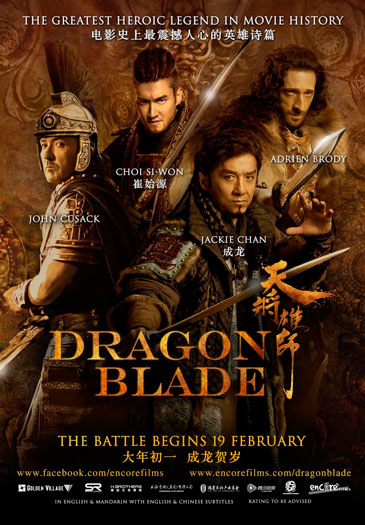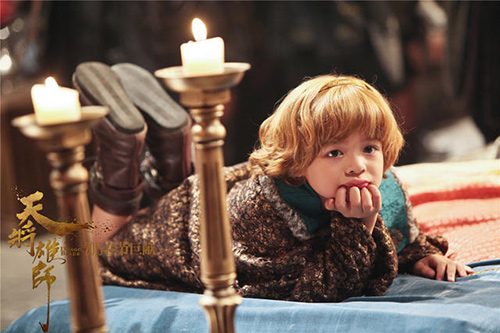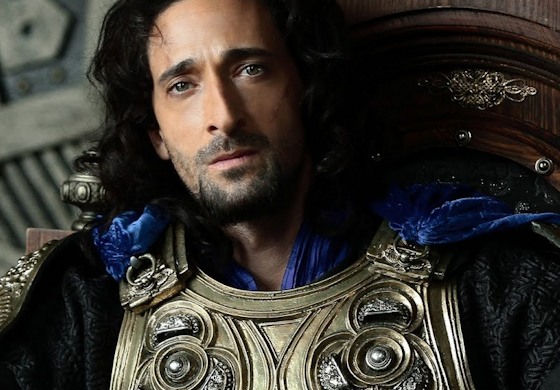Dragon Blade: The hilarious and scary future of the Chinese blockbuster

Mark was feeling a little down on New Year's and we searched for movies to watch. We both wanted something historical and he hit upon Dragon Blade, a piece of historical fiction (with heavy emphasis on "fiction") that was supposed to portray a clash between the Han Dynasty and Roman Republic on the Silk Road. I remember mentioning this movie to

lb_lee a while ago, and it came out in early 2015. With that sexy premise and a star-studded cast of Jackie Chan, John Cusak, Adrien Brody and more, it looked promising in theory. We had both seen the trailer, though, and didn't have very high hopes. Still, we just wanted to see cool battle scenes and turn off the higher brain functions for a while.
The critical brain, however, is not so easily turned off in geeks and ended up making everything gloriously funny. I don't even know where to start. There's the hilariously implausible idea that a branch of the Han military were basically UN Peacekeepers dedicated to keeping the peace on the Silk Road without hurting anyone. (Jackie Chan beating up both sides of a fight to break it up totally counts as hurting in my book, though.) There were the unnecessarily drawn-out fight scenes. There were the huge leaps in the story that left the audience scrambling to fill in the gaps. There were crowds of men screaming in slow-motion about every half hour like they won the Superbowl, while emotional music swelled in the background trying to manipulate the audience into joining in the undeserved emotional moment. It was Hollywood's Greatest Hits put together without any structure or design, making for one of those incoherent movies where you're left wondering at the end what the hell it was all about.
And then there were the parts that got uncomfortable. I'm going into serious spoilers territory here, but it won't make much difference if you plan to catch the movie for laughs. You can see these developments coming from across the Tarim Basin anyway. The hero Huo An is a Hun by birth who was part of the tribes devastated by Han general Huo Qubing's defeat of the Hun. Huo An, who was evidently taken in by Huo Qubing and hence the matching family name, proceeds to look up to and take inspiration from the general who rescued him... and, incidentally, killed his parents and tribe. That an orphaned war abductee would grow to worship his people's conqueror is itself highly uncomfortable, and it's not even consistent with Huo An's supposed mission to keep the peace on the Silk Road through non-violence. Then again this is a philosophy the movie invalidates repeatedly with its glorification of violence, yet another element that makes it incoherent and empty.
The whiff of Chinese cultural imperialism grows much stronger when Huo An brings together the diverse ethnic groups along the Silk Road with the power of his idealism and goodness. Huo is not Han Chinese by birth, but he bears the name of a celebrated Han general whose memory he looks to for everything. Everything except his supposed philosophy of non-violence, anyway. The Central Asian tribesmen under his command, on the other hand, are essentially interchangeable diversity tokens who exist to show Huo's--and by extension China's--unifying power.
Such is the power of Huo's charisma that he even pulls Romans into his orbit. A band of Roman legionnaires, banished and on the run, stumble onto Huo's fortress looking for a place they can take over for their own survival. Under the leadership of Lucius (John Cusack) they are protecting a tiny Roman noble child, Publius, who is fleeing for his life after his evil brother Tiberius killed their father and blinded little Publius to ascend to the Consulship. Tiberius did all this because his father had decided to bestow the Consulship on his youngest son Publius, for whom we don't have an exact age but whose actor Jozef Waite was seven years old at the time of filming.

Who's Supreme Commander of Rome material? You are!
Yeah, in whatever universe Dragon Blade takes place in the office of Roman Consul is an inherited rather than elected position, and it can be passed on to a little boy. And apparently a one-year term of office shared between two co-equal Consuls is worth killing your father and blinding your little brother for, and you can get away with openly committing such crimes. Also, all the Romans in this movie go by just that one name. Deal with it. Oh, and they all speak English, but if you want to make an issue of that with everything else that's going on I will side-eye your priorities. Hard.
So Lucius, the good Roman officer dedicated to protecting this helpless child, hits it off with Huo, the wide-eyed idealist of the Silk Road and they decide to cooperate rather than fight. The Romans and the Chinese have some triumphs together and cultural exchanges in the form of Chinese acupuncture, Roman architecture, and martial arts showdowns. All to the accompaniment of overdone music, of course.
Then the evil Tiberius marches out in force to take the fortress where Publius is holed up so he can eliminate his rival and take the entire Silk Road for himself. He's evidently forgotten that the Parthian Empire will no likey that, especially because the boy he blinded and forced to run for his life is related to the Queen of Parthia is this universe. Perhaps none of the foregoing is as implausable, however, as Tiberius somehow being Adrien Brody.

I just can't stay mad at you, even for appearing in this movie.
Remember how I said this movie takes Hollywood's greatest hits and mashes them together in an incoherent mess? It seems to have learned some of Hollywood's lessons very well, like casting a Jewish actor as the ultimate evil. So if actors of Jewish descent are to get roles in major features they're either helpless Holocaust victims too good for this earth or cackling evil personafied? That's some major mood whiplash right there. Or a surprisingly consistent treatment, considering that both types of roles are fairly dehumanizing. Talented actors manage to bring a lot of depth to what they're given, but that's a result of their artistry and not a mitigation of this detestable Hollywood custom.
I don't think even the cast could have saved this one, though, and the movie proceeds to end in the train wreck it was manifestly destined to be. Tiberius, still implausibly played by Brody, storms Huo's fortress, takes Lucius prisoner, and tortures and blinds Lucius. (It would seem the Consul has a certain fixation.) The tribes along the Silk Road, joined by Lucius' good Romans, rally around Huo to fight Tiberius' evil Romans, but manage to get their asses kicked on home ground. Then the Parthians show up at the last minute, having signed a peace treaty with the Romans. (Does this mean there was a coup back home while Tiberius was away chasing his little brother? Or was it the other Consul who signed the treaty? The Senate? Who knows? Who cares?) Huo, rather than let the Parthians finish the job, proceeds to demand a duel of Tiberius and ekes out a victory after getting his butt kicked by a bored Adrien Brody for most of the fight. This is supposed to be a happy ending, so the music obligingly swells.
As for little Publius and his protector Lucius: Publius' caretaker was cornered by Tiberius' forces with Publius in his arms after Tiberius took over the fortress. The caretaker then vowed that Tiberius would never hurt his master again and committed murder-suicide by jumping from an improbably high parapet, Publius crying all the while. As for Lucius, Huo found him chained up after Tiberius had put his eyes out. Huo attempted a rescue, which proved impossible after Tiberius' men set fire to the cell. Lucius ordered Huo to get out and save himself, and at his request Huo killed his friend by shooting him with a crossbow to spare him the pain of burning alive and to "send him home" to a CGI-festooned Rome.
Yes, the two disabled characters in the movie were both killed by friends who made the "loving" choice to spare them further pain and indignity. While admittedly suicides were a regular feature of that era and culture, it should be noted that these were the only two acts of friendly murder/assisted suicide and the two disabled characters just happened to be the victims. Tiberius ultimately commits suicide as well after Adrien Brody decides this whole movie is an unbearable indignity, but the blinded Publius and Lucius were the only ones who were "suicided" by people who dearly loved them. I don't have to go into how unfortunate those implications are when disabled people face a disproportionate risk of violence worldwide and too many disabled people, including children, are killed or otherwise harmed by their caregivers.
Okay, so not everything was funny and some things were just rage-making and the whole thing sucked. Still, there were some spectatular battles and fight choreography as advertised, and plenty of unintentional comedy to laugh at. The production values were high and would have worked in a better put-together movie. This possible glimpse into the future of Chinese blockbusters--the movie did fairly well in China--is both instructuve and disturbing because, as I said, Dragon Blade learned some of Hollywood's lessons very well. The disturbing part is that the lessons don't stop at overdone CGI effects and manipulative swelling music.
Dreamwidth entry URL: https://ljlee.dreamwidth.org/67880.html